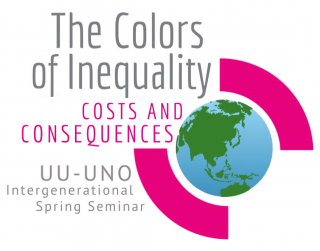The Colors of Inequality

Each year the Unitarian Universalist United Nations Office (UU-UNO) hosts our Intergenerational Spring Seminar. Our 2016 theme was The Colors of Inequality: Costs and Consequences, looking at the intersection of income inequality and structural racism against people of African descent.
Throughout the seminar participants met in collaboration groups to discuss and process the informational panels and activities. At the end of the conference, each collaboration group submitted a statement which contributed to our annual Spring Seminar Statement. Below is our collective statement from 2016.
Unitarian Universalist United Nations Office
2016 Intergenerational Spring Seminar Statement
The Colors of Inequality: Costs and Consequences
Whereas:
As Unitarian Universalists, we recognize the inherent worth and dignity of all people and covenant to work toward equity in human relations.
We are all part of the United Nations, which functions collaboratively to further the development of all countries.
UN Sustainable Development Goal 10 calls for reduced inequalities within and among countries.
1% of the world’s population controls 50% of global wealth, and legal systems favor the status quo.
People suffer unfairly in a world where our goals of community should include peace, liberty, and justice for all, not just for a select few.
We have witnessed inequality in our communities’ systems, including but not limited to the judicial, the personal, and the educational.
People are often born into such inequality and lack the means to change their own circumstances.
Personal and systemic bias has led to massive injustice for people in historically looted communities, including youth.
Issues such as climate change, mass incarceration, solitary confinement, and poverty disproportionately affect those already disenfranchised globally.
Every individual and social group has unique needs that should be respected and addressed in ways that help them grow and approach them with dignity.
We Therefore Resolve To:
Raise awareness about the overall goals of the United Nations, including humanitarianism, respect for universal human rights, and diplomacy.
Stand in solidarity with individuals and communities who are experiencing the effects of income inequality.
Utilize our positions of privilege to engage our communities and call them to action through campaigns, protests, and collaboration.
Call our congregations to partner with organizations that are already working to identify and address the root causes of income inequality.
Work actively to create globally aware communities that promote fair living wages and equal opportunities for groups facing biases and systemic oppressions.
Lobby and use other methods to change policy and influence legislation in our governments.
Educate intergenerational allies, especially youth, to continue to fight for equality.
Remember the importance of the human story and lift up those stories in our communities.
Affirmed by the participants of the Unitarian Universalist United Nations Office Intergenerational Spring Seminar, New York City, 9 April, 2016.
Related Content
- Read a guest post our blog about this seminar from the perspective of one youth participant